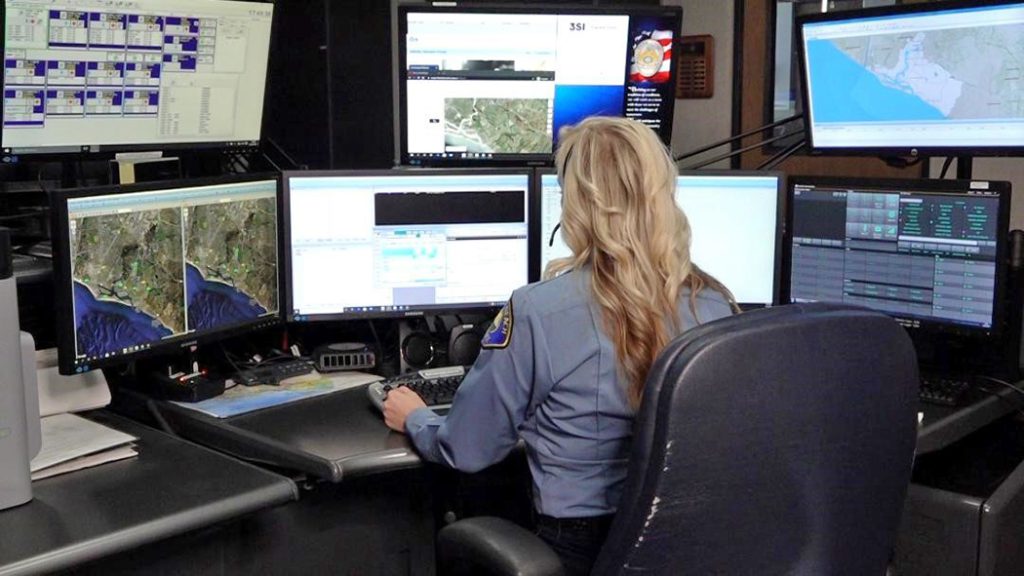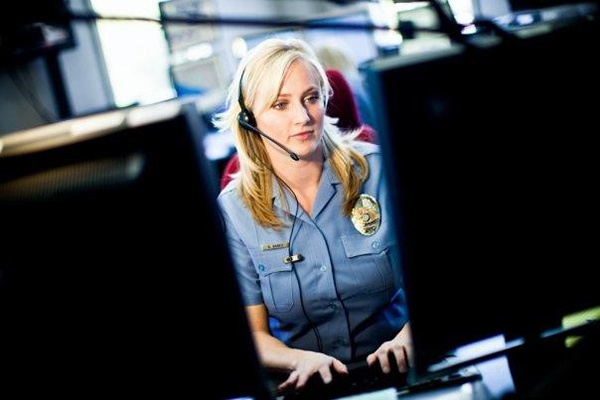
When does 15-seconds seem like an eternity? While waiting for 9-1-1 to answer your panicked call.
In 2022, Newport Beach Police Department dispatch operators answered 172,614 calls, of which 40,629 were received on 911, said Senior Police Dispatcher Brandy Banks.
During her 15-year-career at the NBPD, Banks has learned what panic, fear and emotion are like at their most basic levels—as have Banks’ 11 co-dispatchers over their years of often-stressful 12-hour shifts.
The California State 911 Office has set 15-seconds as the “standard” time for Dispatch to answer emergency calls.
“We were able to answer 100 percent of our 911 emergency calls within the state standard of 15 seconds on 219 days of the year in 2022,” Banks said proudly. That standard is virtually impossible to achieve all the time for dozens of reasons, including a flood of 911 calls ringing in simultaneously about fires, accidents, crimes in progress, and other activities requiring police assistance.
Dispatchers personify the term ”anonymous.” They are voices removed from a body, terse in their communications, arguably without emotion, efficient, but obviously emanated from a person with responsive intelligence.
When necessary, that voice is commanding in its presentation, but mostly “calm in chaos,” Banks said. Unless one hears directly from a cop, dispatchers are most people’s initial contact with law enforcement; unfortunately, dispatchers most often are quickly forgotten when the heroes in blue arrive in flashing black-and-whites, or firemen lumber to the scene atop their gleaming fire engines and ambulances.

From Secretaries to First Responders
For decades, dispatchers were considered simply “secretaries” on the phone, message takers and forwarders. But that has changed with time and technology, along with the enlightened government realization that these “voices” are the unruffled coordinators of reaction by “first responders.” In fact, in 2020, California Governor Gavin Newsom signed into law Assembly Bill 1945, “re-categorizing public safety dispatchers as ‘first responders’ under the California Emergency Services Act,” Banks informed.
All 911 calls within Newport Beach come to the PD, at which time dispatchers determine if there is a “crime in progress.”
Calls that request medical aid are forwarded to Metro Net, a contracted Fire and Paramedic dispatch center located in Anaheim. Banks explains that those calls “are scripted,” for all medical advice given out must be “adhered to verbatim.”
In crime situations, Newport dispatchers on duty as “call takers” must adapt conversationally and coolly to a given situation, while simultaneously sending out automated location information to the patrol car nearest to an event, as well as caller location or specific address as seen on a cell-tower or GPS-connected monitor in front of the dispatcher. In fact, dispatchers sit in front of seven screens that spew out nonstop information—a visual challenge to even seasoned fighter pilots. This is a single example of the technology that accelerates response time in Newport. In fact, police officers average only three-minutes to arrival after a 911 call is received.
The complexity of radio coordination of police units is compounded by the fact that other 911 calls may also be coming in as other situations unfold. And that is why there are usually four dispatchers on duty in three shifts throughout the day: two are call takers; one a patrol-unit communicator who exclusively passes on to officers information from the call- takers; and a fourth “back-up,” who does whatever is needed to support the call takers.
Back-up information can be as important to an officer as extra ammo clips.
Information such as what is going on, crime location and its history, background info on callers as well as possible suspects, and more — anything to enhance officer safety. Other information required may include phone numbers of businesses, names of affected citizens, witnesses, and more. Dispatchers often call a home phone number to try to contact a suspect; or communicate to a suicidal individual. The list seems endless.
Each Call is the Most Important Call
While a “crime-in-progress” call is being handled, another dispatcher may be fielding a simple parking complaint, or trying to calm a citizen raging about a barking dog next door that is keeping the baby awake. No matter the level of seriousness of the call, each caller feels as their call is the most important event of the moment.
Although Banks holds a BA Degree in Organizational Management (evident when you watch her manage calls), she states that the job itself does not require a college degree, nor do you have to type a million miles a minute, but “It helps if you can multi-task, remain calm and level headed in stressful situations. But truthfully, in some ways, nothing can really prepare you for this job.”
Currently, Dispatch is short three people. Three hundred candidates answered a recent
employment ad, five were chosen for initial interviews and in-depth background investigations. If hired, they will undergo a full year of intensive on-the-job training. Maybe one or two will make it through the full 12 months, Banks apprised. In that time, they will have to learn at least 100 codes; multiple abbreviations in dispatch-specific language; the basics of federal, state and city laws; understand the differences between civil and criminal issues; animal and parking statutes; handle home alarm controls; and become facile in lines-of-questioning, all from memory and all in a calm and reassuring voice.
And they have to be able to switch between multiple radio frequencies to communicate with other agencies without losing communications to callers.
Even with all the stresses, some dispatchers sign up for overtime or volunteer when necessary.
Remaining calm unto itself can be stressful, especially in situations involving officer loss or severe injury. It was difficult for all the staff when last year a Huntington Beach PD helicopter crashed into the waters of Newport Bay, claiming the life of one of the two pilot officers.
“That was a terrible tragedy that words can’t describe,” Banks recalled.
With that indelibly impressed in her mind, Banks emphasized, “One of the reasons we get into this work is so that we can help officers to do their jobs and see them go home safely at the end of every night.”
Police dispatch is serious business. But often, 12-hour shifts are not without their moments of stress-relieving calls. Banks shared some examples:
“Someone called 911 on election night wanting to know where the nearest voting booth was because the candidate he wanted was losing and he hadn’t voted yet. Another caller thought we could help with their bathtub plug not working. And I had a drunk male call me on 911 to report a bunny rabbit hopping through the West Oceanfront Lot at Newport Pier. Once he found out my first name, he proceeded to sing ‘Brandy, you’re a fine girl’ to me. I have to admit, I let him carry on, because it cracked my partners and I up!”
Perhaps the best call came when Banks took a call from a panicked husband driving his pregnant wife to the hospital through Corona Del Mar. “I gave him directions to turn at the fire station on Marigold and my partner notified Metro Net he was coming. I stayed on the line and heard the firemen come out, lean the wife’s chair back in the car, and next thing I heard was a baby crying! Pretty cool!”
“Our talented dispatch team is second to none. The way they are able to calmly receive traumatic 911 calls, organize our resources and deliver those resources with such efficiency and grace is beyond impressive,” said Police Chief Joseph Cartwright. “The sign on the door of our dispatch center says it all: ‘The safety of over 80,000 people begins in this room — they’re in good hands.’ I couldn’t have said it better myself.”
Other than mom’s cell phone, 9-1-1 it may very well be the most important phone number in your mental Rolodex.




